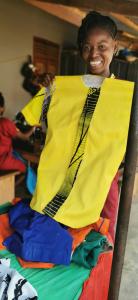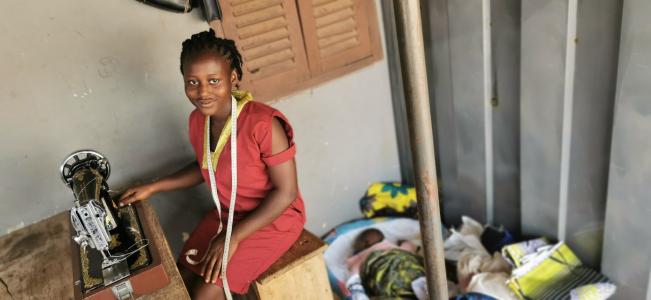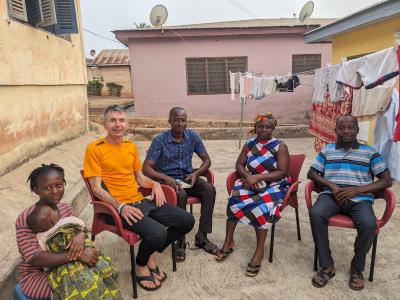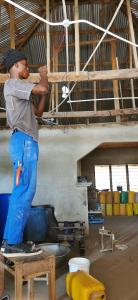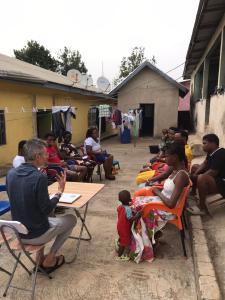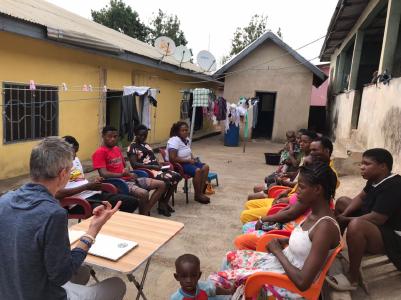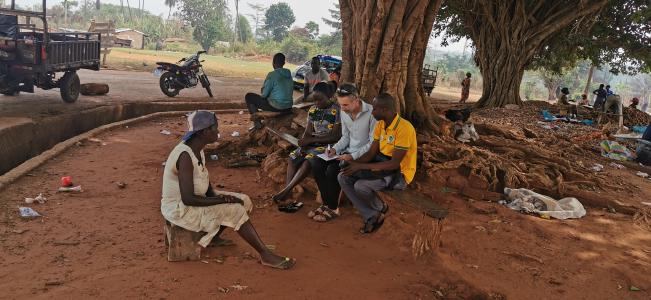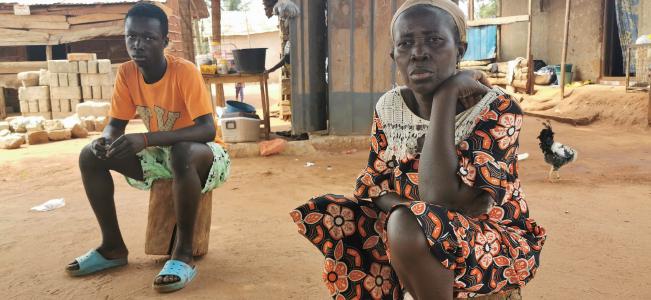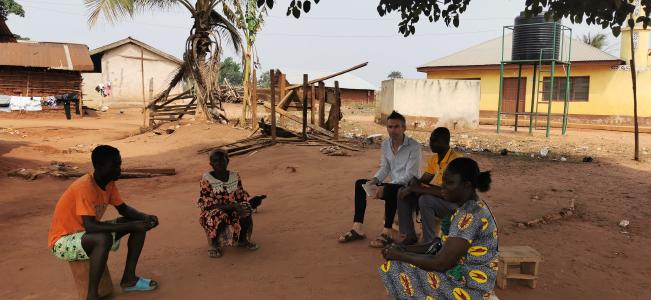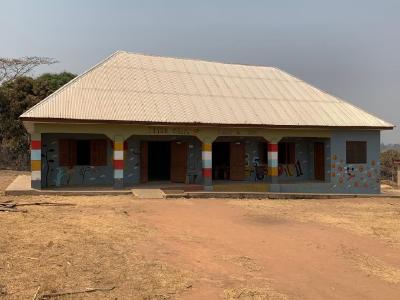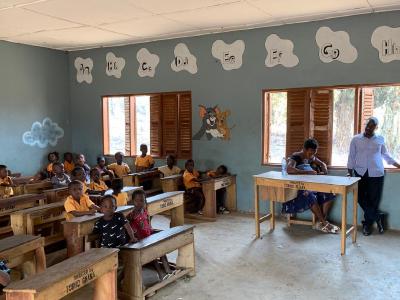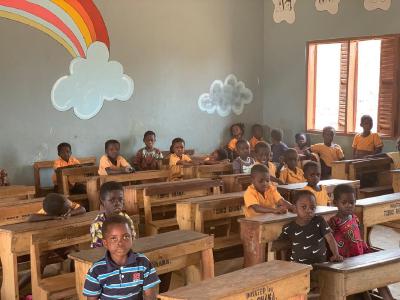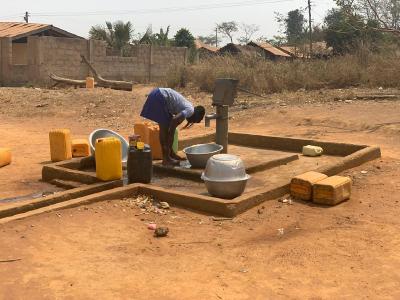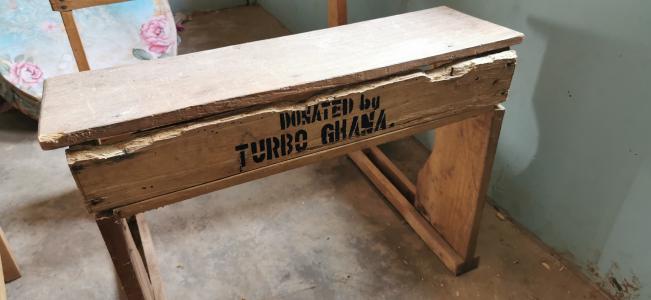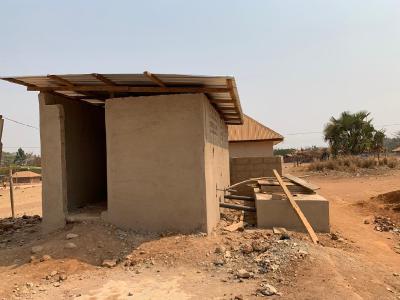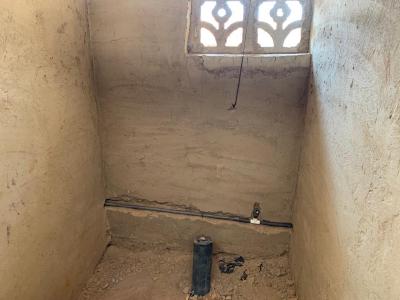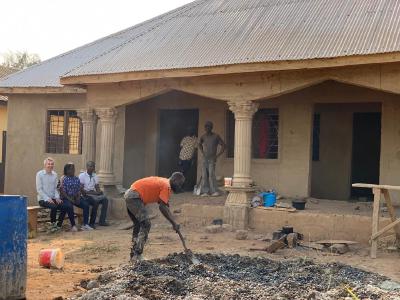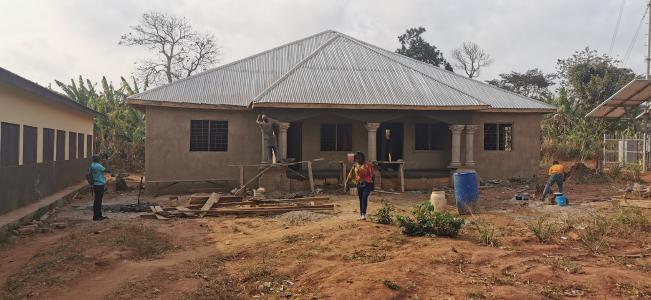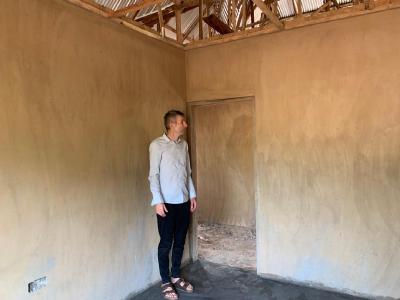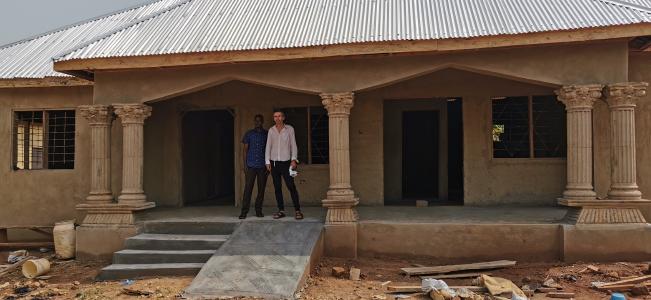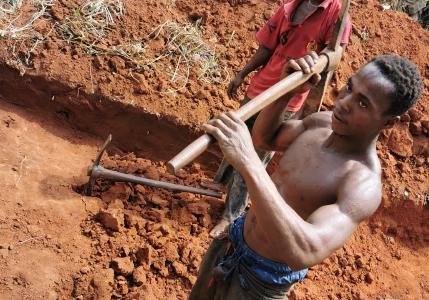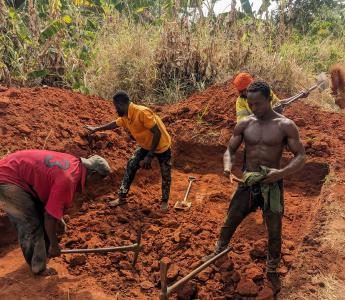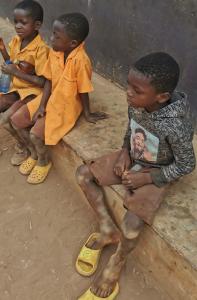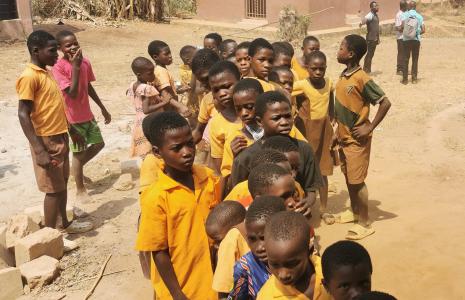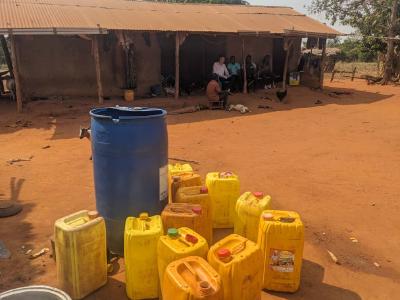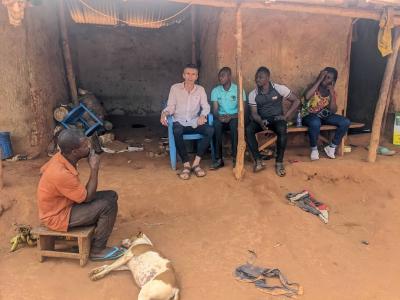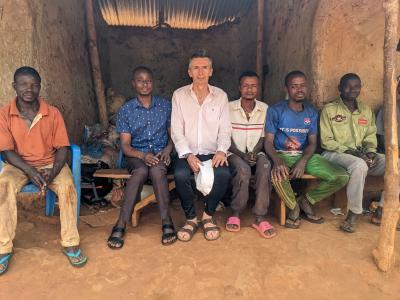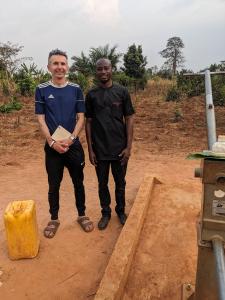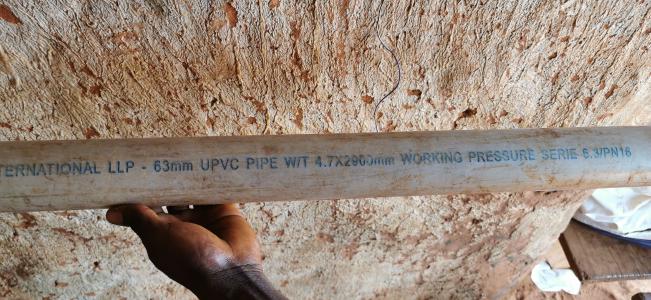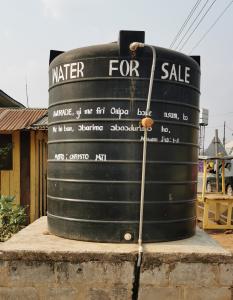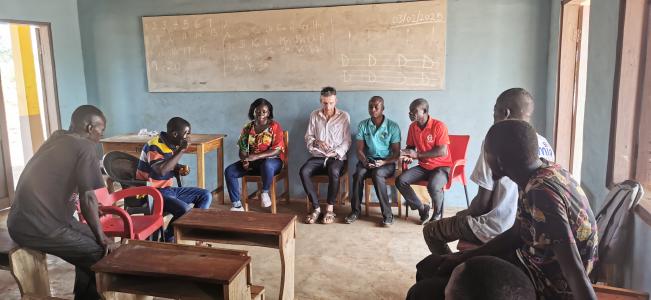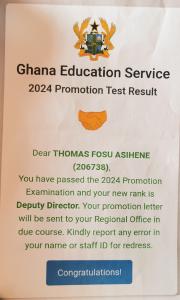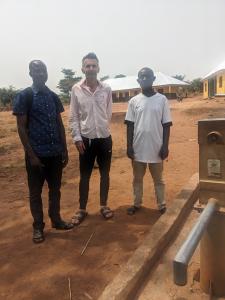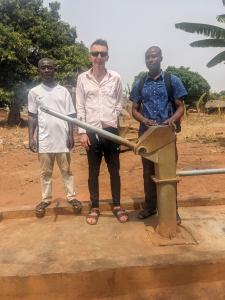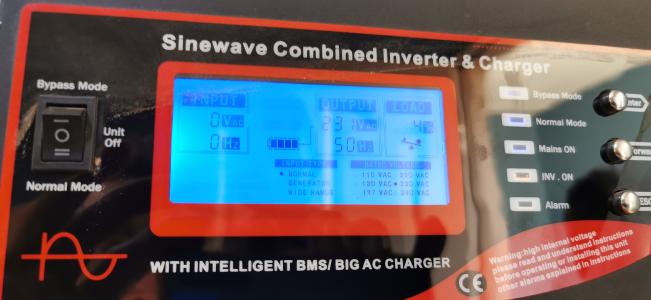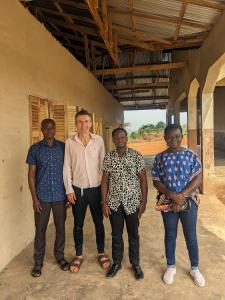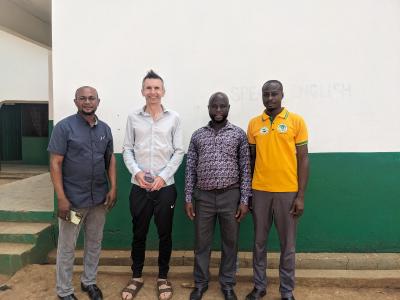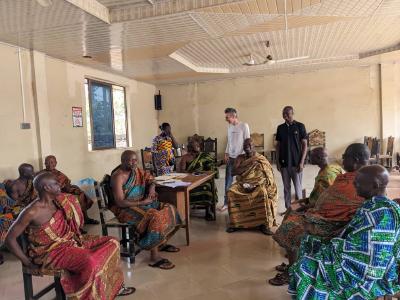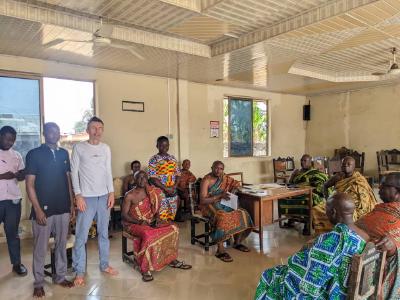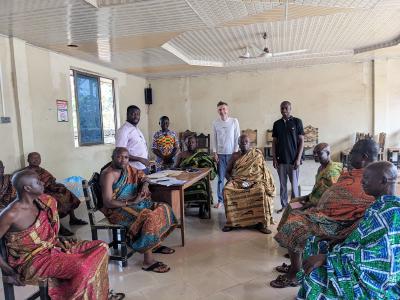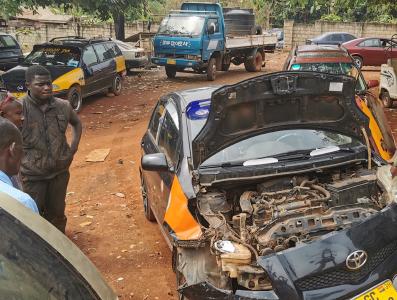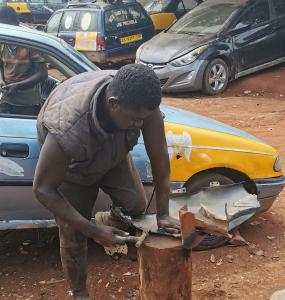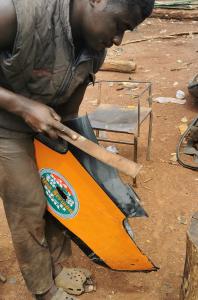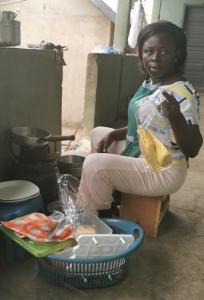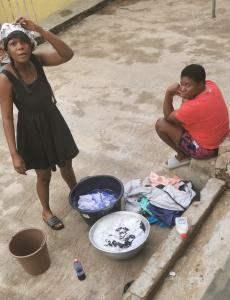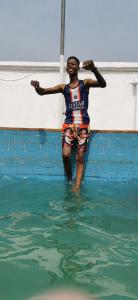Visit in February 2025
February 4, 2025
Click on any photo to see a full-sized version.
Apprenticeship scheme
Last year we expanded the apprenticeship from two apprentices to nine. LY is one of the new apprentices we took on in dressmaking, and she has been a great success. She has prior experience of dressmaking and she is able to teach her trainer (MO) how to sew men’s clothes. In the picture, you see she is making a mens shirt (the collar hasn’t been finished yet). This is helping M expand into the mens clothing sector.
JO had taken maternity leave when she gave birth to her baby in August 2024. We continued her apprenticeship stipend to support her during her leave, and we are delighted she has decided to come back to work with her baby each day. In the picture, the baby (called V) is sleeping on the floor behind J. On another day, her parents came to thank Turbo Ghana for letting Josephine continue her apprenticeship. They said the house they are living in now which I had visited last November isn’t their house. Their house had collapsed in the rain, presumably because it was in even worse condition than the one they’re in now, which they’ve temporally moved to while they try to save up to rebuild their house. Sometimes a casual remark like this one reveals such immense challenges and hardship.
AO (pictured) is one of the two electrician apprentices that was also part of our expansion last year. He’s doing very well; his trainer P is very happy with A and the other Turbo Ghana apprentice he has, called EO. During our visit, A and E also installed ceiling fans in the accommodation we have for some of our apprentices.
We had a meeting with all the trainers and the apprentices (almost all came).
The apprenticeship scheme is about human beings, and inevitably that leads to some challenges in managing it. A difficult situation arose just before my visit: EO decided he didn’t like his tiling apprenticeship in mid-January, and stopped attending. The apprenticeship coordinator VD informed us, and since Mark was there in February we arranged to meet him (and his mother, in the photo). EO said he wanted to change trainer, because the trainer made him do junior work. It seemed he didn’t get on with the trainer. I was a bit sympathetic with the request to change, but both Kwasi and V said that doing so would send the wrong message and would lead to other apprentices requesting changes. So I decided to go with their judgment. We offered E the chance to continue with his existing trainer, or withdraw.
We had decided not to expand the apprenticeship scheme in February, but to keep it at the current level of nine apprentices. However, we got a letter from R, a young man (16) who seemed in a desperate situation, so we decided to consider whether we could add one more. R told us he had been abandoned by both his parents, and was living with his grandmother and had no food. He wants to train to be a builder. We went to visit his grandmother to verify the story. It turned out that R’s mother was known to be alive five years ago, and R had met her then, but neither he nor his grandmother had any knowledge of the father. We asked R to visit us again a few days later and questioned him a bit more, to try to verify the situation and figure out whether we can help him. After discussion, we decided we would offer him a two-week trial with BR, a builder we use on our projects. If B considers that R would be able to be a successful apprentice, we will add him to our scheme.
A strategic decision for Turbo Ghana is how we balance supporting apprentices with our other projects, such as boreholes and buildings. Very roughly, an apprentice costs about £1200 over 3 years, while a borehole costs about £5,000, and a building about £20,000. We discussed this with Kwasi Alare (who manages all our projects), with VD who manages our apprenticeship scheme, and others. On the whole, we think we should probably not expand the apprenticeship scheme too much until we have managed to graduate a few of them. Generally, apprenticeship graduation is a formal process governed by the relevant industry association (for example, the Ghana National Tailors and Dressmakers Association, whose graduation we attended last November). LY, EO and AA are currently the most experienced in their trade and may be in a position to graduate in 2026, while the others probably need until 2028.
Aframano kindergarten school and nearby borehole
Our flagship project the kindergarten school in Aframano (completed 2018) is looking great. When we visited the classes were in progress and Ms A (the teacher that started in 2018) is still there. Mr K was the other teacher originally, but he has retired and is replaced by another teacher called M. It is a pleasure to see that the manual borehole in Aframano (which serves the school as well as the community) is always in use.
One of our desks has an infestation; we don’t know what it is, but the carpenter that supplied all the desks is going to replace it. The headteacher Mr S will review all the other desks so the carpenter can address any other issues at the same time.
There are several other minor repairs needed on the assets Turbo Ghana has provided. We want to encourage a culture of maintenance, where things get fixed as soon as the problems are noticed, instead of waiting for them to get worse and break completely. Some of the toilet doors are loose and will fall off if not attended to. Some keys got lost and they had to break the locks; these locks now need to be replaced and the doors fixed. One problem is that (like all schools in Ghana) the school has no money of its own. The government supplies teachers, but the other costs the school faces are not met. We have said we can allocate a small budget (likely £100) for these repairs.
Aframano teacher toilet
The teacher toilet is nearly complete (likely complete in a month). It will consist of two toilets (male and female) and two wash rooms (male and female). We have opted for freshwater flushing toilets and showers, which will ultimately be fed from an overhead tank of water. But this can happen only if we mechanise the currently manual borehole so that water is pumped into the tank. We probably won’t mechanise the borehole for about one year, because we want to ensure that the electricity supply in Aframano is stable enough and reliable enough before making Aframano’s water dependent on it. That means that for the next year, the toilets will be flushed with a bucket of water, and the shower will also be based on a bucket of water (which is the most common arrangement in Ghana).
Anyankamamu teacher accommodation
The teacher accommodation in Anyankamamu is looking great. Its pillars (which are quite common in Ghana) give it a presence and a feeling of quality, which is nice for the school. The plastering was being finished when we visited. The whole building should be completed within about 4-6 weeks.
Our block consists of five rooms. There are nine teachers in the school, and all of them appear to want to sleep in the teacher accommodation, so they will have to share rooms. We talked to PY who wants to live there with her child, who will enroll at the school (they currently live in Kofiase). We talked to GA and CB who also want to live in the teacher accommodation. Living there will be challenging at first, as there is no electricity, and no water. The Government has built an electric borehole, but as there isn’t any electricity in the area it can’t be used (this is just down to terrible planning). We are helping the school source a generator to provide electricity to pump the water in the short term. In the longer term, the headteacher is asking the district assembly for permission to convert the borehole to a manual one (and convert it back again if/when electricity ever arrives) – this is preferable because there’s no budget for paying for diesel. Turbo Ghana will pay those costs if the permission is obtained (probably £100). Kwasi had the good idea that the school should sell water to local farmers for irrigation, allowing the school to collect a fund for paying for diesel. At some future time, we may put solar panels on the school roof to allow teachers to charge phones and have night-time lighting. Anyankamamu is unlikely to get electricity any time soon, because the size of the school and nearby community is too small to make it an urgent priority.
Digging the sceptic tank (to a depth of 3 metres) for the accommodation is hard work if your tools are shovels and pick axes, and the temperature is 30 degrees.
Anyankamamu is a remote school and whenever we visit, lots of children come to see us. Vivian brought biscuits and gave one to each child (they are lining up to get their biscuit).
Anyankamamu borehole
Anyankamamu is both a school and a community, but they are quite far from each other (about 1km). We built a borehole for the Anyankamamu community last year, and it has been operating successfully since then. The person in charge is A, who lives nearby. The community is operating a subscription model. 50 families have subscribed at 20 GHC per month, generating 1000 GHC (£50) per month. An issue with the subscription model is that there’s no practical checking of whether water consumers have subscribed or not. But it can work, if the community is small and everyone knows everyone else and their subscription status.
Atonobi borehole
We finished the borehole in Atonobi in about March 2024. We had not announced our visit today, and when we arrived we found that the borehole isn’t working. We pumped, but no water came. When Turbo Ghana builds a borehole, we ask the community to form a committee to manage it. Their principal responsibility is to maintain a fund to pay for repairs. The usual system is that the water consumers pay for their water per use (0.3-0.5 GHC for what’s called a “gallon” container, although I think the gallon container, yellow in the photo, is about 40-50 litres or about 10 imperial gallons), and this money goes to the repair fund. When the Atonobi community set up the committee, they insisted they wanted a monthly subscription model instead of a pay-per-use model. We accepted that, on the grounds that they should know best what works for them.
So we were keen to find out why the borehole is broken, and met with NT who is the committee chair (orange t shirt). He said it broke 3 months ago. “We called the repairer, who is also the original installer. He repaired it for 600 GHC (£20), but it broke again the next day. So we didn’t call him again.” Why not? If his repair didn’t work, he should repair it again for free.
After more discussion, and a few phone calls, the full story emerged. The repairer had sent his apprentice, who may not be experienced enough, so that may explain why the repair didn’t work. But the apprentice repairer complained that when he came, there was nobody to take care of him. Because the community is remote and can’t be reached by vehicle, the repairer is supposed to park in the town and the community should pick him up by motor bike. Then they should help him with the heavy work that may be involved (for example, pulling the pump or lining pipes from the bottom of the borehole), as it’s too difficult for one person alone. The repairer complained that they made him wait a long time for the pick-up, and no-one helped him. It gives the impression that the community may not value the borehole. But I don’t think that’s the case. The problem is that it’s hard to motivate an individual to be in charge, since it is unpaid work.
The subscription model is also an issue. Only 8 households are paying 20 GHC per month. At that rate, it takes about 4 months to collect enough for a repair, which is too slow. Some households are taking the water without paying, and many farmers that don’t live there are using the borehole for irrigation. So it is getting heavy use.
The community can buy water from the town (4-6km, but the road is very poor so it takes a long time to transport it by vehicle). This costs GHC 10 per gallon, at least 20x the cost of the water from the borehole. So it’s really surprising that the community is not insisting on finding a solution to the repair arrangements.
Way forward. The borehole was repaired over the weekend and we got to see it working before we left Ghana. The repair consisted of replacing some sections of pipe (pictured) that had somehow become cracked. The problem is solved for now, but the longer term problem is that the subscription model isn’t working. As Kwasi originally advised, the community should have a pay-per-use model. This means that the borehole should be locked, and whoever is in charge should open it at agreed times to sell the water (whether to community members or farmers).
I think the problem is that it’s effort and hassle for NT. So I want to talk to Kwasi about a profit-based model. The person in charge should be allowed to sell it at a higher price for profit, so that they are motivated to collect the money from consumers, and motivated to keep it in repair. It seems that selling water for profit is common in Ghana. The photo of water for sale is in Nsuta, but I think it should work even better in a remote place.
Clearly, we need to continue monitoring the borehole and help the community find a sustainable solution that works for them.
Kontonho school
Our school in Kontonho (opened August 2024) is one of our flagship projects. As previously documented, there were two teachers (headteacher TFA and teacher GM) at the time of our visit last November, and they had managed to enroll about 80 pupils. Now the school has 92 students. There are three class rooms (KG1 and KG2 total 58 pupils, and Primary 1 has 34).
Headteacher T (red t shirt) described some of the challenges he faces. Some students enrolled but aren’t coming, maybe because their parents have gone for a family visit to the north of Ghana (where they likely come from… this region has a lot of climate-change migrants who have come from the north), or are helping their parents with farming or selling produce in the market. In fact, our visit was on Friday, which is market-day. There were 52 pupils in attendance today (yesterday’s figure was better, at 63).
Another challenge is that the school hasn’t been officially commissioned, even though it is open and working. Not being commissioned means that the municipality hasn’t set up the school feeding programme (daytime food for pupils), or given the headteacher a budget for teaching materials. The change of Ghana government and consequent change of the Municipal Assembly means that there is currenly no Municipal Chief Executive, delaying the official opening. We hope that person will be appointed in May so that the official opening of the school can happen before September 2025.
At least the school has water, thanks to our borehole, but headteacher T lacks buckets and cups to distribute the water in class. He also wants pens, markers, paper, posters for the walls, and chalk. There are also some minor maintenance issues with the building. We’ve given him a budget of 2000 GHC (£100) to help him with these immediate difficulties. We can do that again if needed.
T has been promoted to director level in the Ghana Education Department, and could now enjoy life as an office worker in town instead of being a rural teacher in a farming community. But happily for Turbo Ghana, he doesn’t want to! He’s decided to stay on as headteacher. I am very glad about that. I think he is a big help for the success of our school.
As mentioned, we built a borehole next to the school, and it has now been successfully operating for a year. It’s run by a committee from the local community, who collect money for the water in order to pay for repairs. It has been a bit delicate to put this in place, because the school has the right to water from the borehole free of charge, while the community members have to pay. We think this is the right approach; the school has no funds to pay for water, and the children that benefit from it are of course from the community. We discussed that the school should take ownership of the borehole and be represented on the committee; that feels right to us because the school is properly established and has a bank account, and could benefit from some IGF (internally-generated fund) by selling water to farmers. So we are encouraging the community and the school to put these arrangements in place.
Solar power continues to be a technical challenge for Turbo Ghana. It’s not working, so Ebenezer the installer is asking us to clean the solar panels (to remove dust and increase their efficiency) and let the batteries charge without drawing power for a few days.
School extension in Pataase, Sesease and Kokoben (also known as PSK)
We met Mr Rockson who is the head teacher. He’s very happy with the two new classrooms we’ve built, and they look great. There are 50 pupils in JHS1 and 36 in JHS2. They are being used, and we are providing furniture, even though they haven’t been officially opened yet. PSK had also asked us for a school borehole and a toilet block. Those items are still on our list, but we will see how the school works out before we invest more.
St Peter’s school (new request)
The head teacher COW has written us a letter asking for assistance, so we went to visit. We met C and his colleague EMS. The school was established in 2004 by the Catholic Church, and then adopted by the government in 2009. It has 274 pupils in Kindergarten and Primary, and 11 teachers. They have six primary classrooms, but lack accommodation for the two kindergarten classes, and ask for our assistance in building that. They started building a few years ago but ran out of money (they didn’t get further than the foundations, but apparently the foundations are good and usable). Currently they teach the kindergarten classes in the canteen. The school seems to have a lot of land. It looks nice, with a big sports field. The school doesn’t have any water; they fetch water from the nearby stream. Of course they’d like a borehole too, but the kindergarten building is their priority. The school has a small IGF (“internally generated fund”), arising from the fee that food vendors pay for the right to sell food on the school premises.
We discussed why the Catholic Church (after all, one of the world’s wealthiest organisations) doesn’t help them. The answer is that the Church is still interested in the school but the Parish lacks funds and that is why they let the school get adopted by the government in 2009. They consider it is not their financial responsibility now. It occurred to us that we could consider appealing to Catholic organisations in the UK.
Nsuta chiefs
Since our apprenticeship scheme is based in Nsuta, we were advised to inform the traditional chiefs and obtain their approval. Although not part of the democratically elected government (central and local) in Ghana, traditional chiefs are an important influence locally and are highly respected. So we went along, and they were very receptive. They welcomed us and asked us to expand our scheme. Then they asked us to base Turbo Ghana in Nsuta. We said we’d think about it.
Accident
Our driver had a minor accident (we weren’t in the car at the time). A car traveling in the opposite direction moved into his lane to overtake a parked car. To avoid a head-on collision he manoeuvred to crash into the parked car. So he is considered liable for the damage to both cars (his and the parked one), even though the root cause was the car traveling in the opposite direction.
In the UK this car would have been written off years ago, but in Ghana it has many more years of life thanks to the painstaking metal bashing to return the wing to its original shape. Turbo Ghana decided to cover the repairs (£150, some parts were needed too) because it’s just too difficult for locals to cope with these unexpected costs.
Social
